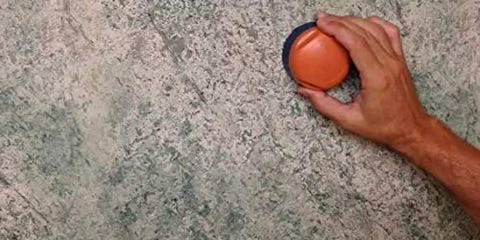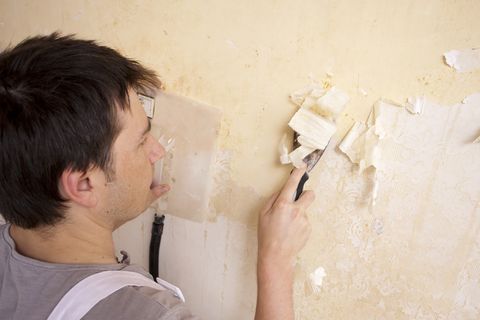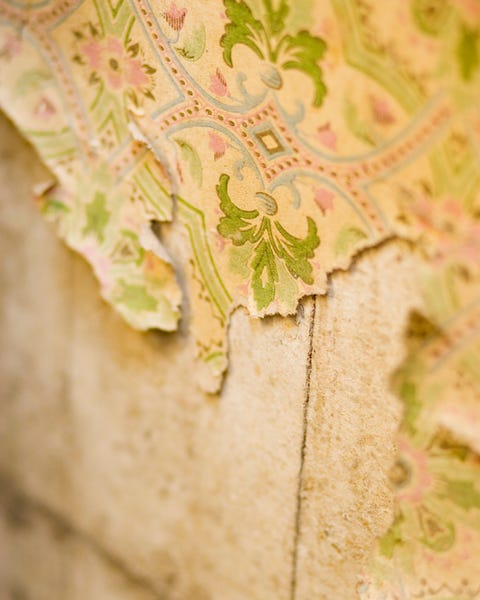How to Remove Wallpaper Border Without Damaging Wallpaper
Sometimes wallpaper is just what a home needs to create a grand statement. But when it's outdated, clashes with the aesthetic you're hoping for, or isn't in great shape, it can be a disaster. And even if you aren't generally a wallpaper hater (there are some seriously cute options, some even removable, now-a-days!), you may not be a fan of the design the previous owners installed in your home. No matter the situation, wallpaper can be removed, and we've got some quick steps and tips to help guide make wallpaper removal as seamless as possible. You really can remove wallpaper...without losing your mind.
What to Know Before You Start
Safety first. Things are going to get messy and wet (well, at least damp) on this job, so it's a good idea to turn off the electrical and tape off any outlets that'll be in your path during the work.
Also, get prepared for your patience to get tested. Wallpaper removal is totally doable, but it does take time, creates a sticky mess (cover those floors and baseboards!), and makes you question what in the world you were thinking at least once. Take heart, though. With a few simple steps, you can have your walls sparkling in about a weekend, give or take depending on your square footage.
This content is imported from {embed-name}. You may be able to find the same content in another format, or you may be able to find more information, at their web site.
How to Remove a Wallpaper Border
Wallpaper borders are removed in the same way as full panels with the added challenge that most, if not all, of the work takes place from a step stool or ladder.
First, test a wallpaper seam with the tip of a metal putty knife, taking care not to gouge the drywall with the knife. If the paper comes up and peels off easily, you're in luck! Peel away. If it doesn't, you'll need to soften the glue before you can strip the paper off.
Tip: Don't use a plastic putty knife; they're too thick to get under the paper. Also, consider filing down the edge of your metal putty knife so that it's a bit more rounded. This will help you to avoid accidentally gouging your drywall when trying to lift up the paper.
To do this, grab yourself a wallpaper scoring tool, and roll the tool over the wallpaper in small sections. The scorer will create small tears in the paper (don't press too hard or you'll damage your wall), which will allow either water or a wallpaper stripping solution to soften the glue underneath the paper.

Wallpaper Scorer Remover Tool
Spray the torn area of the border with the water or paper stripper (or dampen it using a wet sponge), and let sit for a few minutes to work on the glue.
Tip: Some suggest using a one-to-one mixture of fabric softener and hot water for this! The hotter the water, the better, so wear gloves.
Test a small area using your fingernail—if it the paper comes off easily, you're in business. If not, repeat the wetting process and let it sit a bit longer to do its thing.
When the perforated portion is wet and peels off easily when you test it, use the corner of your putty knife to strip off the paper. Don't be surprised if the glue stays behind; we cover that piece of the puzzle in the next section. Repeat the entire process—scoring, wetting, scraping—until the border is gone.
How to Remove Wallpaper Glue

Andrew_Howe Getty Images
After you've removed all of the paper from a wall or border, you'll probably have sections or spots sticky with adhesive. The easiest way to remove these is to scrub the wall with hot soapy water (try dish detergent) and a sponge or wash cloth. You want to get all of the residue off the walls, so don't be tempted to skip this and paint right over it. You'll risk creating a mess that won't work well for painting or repapering.
Tip: Really having a hard time removing the glue? Try upping your game to a gel stripper.
How to Remove Really Old Wallpaper

Gwendolyn Plath Getty Images
Wallpaper that's decades old can be removed following the above tips and methods, too, but you may have to put a good deal of elbow grease into it, depending on whether it was professionally installed or not (professional installs tend to be harder to remove than DIY jobs). If your home is older, you may have plaster walls instead of drywall—the latter of which is softer and more prone to dampness and gouging—so be extra careful.
This content is created and maintained by a third party, and imported onto this page to help users provide their email addresses. You may be able to find more information about this and similar content at piano.io
How to Remove Wallpaper Border Without Damaging Wallpaper
Source: https://www.countryliving.com/remodeling-renovation/home-makeovers/a27614759/how-to-remove-wallpaper/